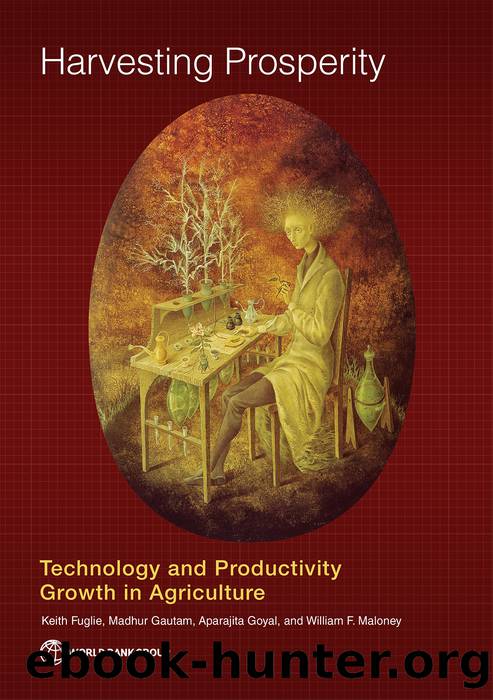Harvesting Prosperity: Technology and Productivity Growth in Agriculture by Keith Fuglie Madhur Gautam Aparajita Goyal & William F. Maloney

Author:Keith Fuglie, Madhur Gautam, Aparajita Goyal & William F. Maloney
Language: eng
Format: epub
Foster Regional and International Links
Although agricultural technologies need to be tailored to location-specific conditions, much of the pool of knowledge and genetic resources that scientists draw upon to make these adaptions is supplied by universities and research institutes in developed countries or centers participating in the CGIAR, which are sometimes referred to as agricultural research institutes, or ARIs. Basic and applied research at ARIs continues to make major methodological advances in the scientific tools used in agricultural research. Over the past couple of decades, for example, major advances have been made in the science of crop and animal breeding. The use of the haploid method in maize breeding has reduced the time needed to develop improved parent lines from ten to two generations. Using genetic markers in animal breeding now enables scientists to predict the milk producing potential of dairy calves as soon as they are born (as opposed to waiting four to five years for the animals to mature and produce). The merging of molecular biological and information technologies has dramatically improved the rate of genetic progress possible through breeding. The recent emergence of low-cost gene editing tools has opened up new avenues for making targeted genetic improvements. ARIs are also sources of broad and accessible collections of crop genetic resources, such as those maintained by the CGIAR centers and the USDAâs Agricultural Research Service.
Many developing countries cannot hope to create the necessary scale in their agricultural science institutions to replicate the basic science activities and resources of the ARIs. Hence linking their institutes and farmers to this global knowledge is critical. To make use of these scientific advances and resources, agricultural scientists in developing countries need to form networks and collaborative relationships with scientists in ARIs. This needs to be built into their budgets and human resource policies, for example by enabling staff to attend international conferences, take study leaves abroad, and engage in collaborative research with scientists from ARIs.
Such links take advantage of the significant economies of scale in scientific activities that produce global public goods, like crop genetic conservation, characterization, and prebreeding (moving genetic traits from wild relatives to crop breeding parent lines). By linking their national research programs with the CGIAR centers and other ARIs, developing countries can gain access to these scientific developments, avoid duplicative efforts, and focus their own limited R&D resources on local adaptation. One study found that in global wheat improvement, for example, due to economies of scale in its global research program, the International Maize and Wheat Improvement Center (CIMMYT) produced such superior traits in the parent lines it developed that they accounted for more than two-thirds of new varieties released in developing countries. Many developing countries could afford to have fewer wheat breeders and focus their wheat research on adapting this material to local conditions (Maredia and Eicher 1995). In fact, through such partnerships even small countries can earn high returns from public R&D. In Sub-Saharan Africa, even though larger countries tended to have higher rates of return to
Download
This site does not store any files on its server. We only index and link to content provided by other sites. Please contact the content providers to delete copyright contents if any and email us, we'll remove relevant links or contents immediately.
The Brazilian Economy since the Great Financial Crisis of 20072008 by Philip Arestis Carolina Troncoso Baltar & Daniela Magalhães Prates(133833)
International Integration of the Brazilian Economy by Elias C. Grivoyannis(110625)
The Art of Coaching by Elena Aguilar(53199)
Flexible Working by Dale Gemma;(23285)
How to Stop Living Paycheck to Paycheck by Avery Breyer(19720)
The Acquirer's Multiple: How the Billionaire Contrarians of Deep Value Beat the Market by Tobias Carlisle(12314)
Thinking, Fast and Slow by Kahneman Daniel(12267)
The Radium Girls by Kate Moore(12018)
The Art of Thinking Clearly by Rolf Dobelli(10455)
Hit Refresh by Satya Nadella(9126)
The Compound Effect by Darren Hardy(8949)
Tools of Titans by Timothy Ferriss(8369)
Atomic Habits: Tiny Changes, Remarkable Results by James Clear(8327)
Turbulence by E. J. Noyes(8040)
A Court of Wings and Ruin by Sarah J. Maas(7822)
Change Your Questions, Change Your Life by Marilee Adams(7761)
Nudge - Improving Decisions about Health, Wealth, and Happiness by Thaler Sunstein(7694)
How to Be a Bawse: A Guide to Conquering Life by Lilly Singh(7472)
Win Bigly by Scott Adams(7184)
